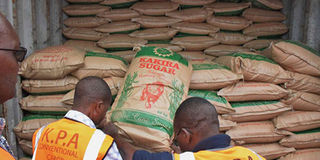Sugar imports hurt economy but also pose health hazard

Illegal sugar impounded at the port of Mombasa on May 12, 2018. PHOTO | WACHIRA MWANGI | NATION MEDIA GROUP
What you need to know:
- That Kenya has continuously produced inadequate sugar in the last three years has necessitated importation to bridge the gap.
- Bailout, though not the best option, is the only justifiable option for the survival of millers.
It did not come as a surprise when 400 metric tonnes of illegal sugar valued at Sh38 million was dumped into the Indian Ocean by Kenyan authorities.
The consignment had been imported from Brazil, disguised as machine parts in 16 containers each having 500 bags of 50kg of sugar.
Obviously, the illegal consignment had been brought in by well-healed operators who had seen a lucrative business opportunity.
The seizure came just weeks after President Uhuru Kenyatta declared at the Governor’s Conference in Kakamega that he was going to bring to a halt the importation of sugar to boost the capacity of local millers.
This was a recognition by the head of State that unless there is proper intervention on issues affecting the millers, their future would remain bleak.
PRODUCTION
That Kenya has continuously produced inadequate sugar in the last three years has necessitated importation to bridge the gap.
Kenya requires about 800,000 metric tonnes annually for its domestic market but has been producing about 500,000.
However, early in the year, the country had imported more than it needed.
A lot of the imported sugar comes from Brazil and, according to International Sugar Organisation (ISO), the quantity of the import last year increased by over 2,000 per cent.
Much of the sugar is raw and requires further processing before it can be sold to consumers.
Unprocessed sugar is not meant for consumption and the propensity to consume anything cheap has long-term health consequences.
QUALITY
A meeting between millers and other sector players this year almost turned chaotic when the millers demanded to know why one importer had not reprocessed the raw sugar it had brought into the country yet was offloading into the retail market at low prices, thus denying the local millers their rightful share of sales.
The 8th Annual Sugar Conference held in Nairobi recently delved much into dim facts about raw sugar.
A key issue of discussion was the quality of the sugar that Kenya imports, which is compounded by our propensity to consume more and produce less.
The above issues raise important concerns such as the safety of citizens even as the country grapples with the question of how to provide universal health care.
HEALTH
In the wake of rampant cancer cases and the narrative that sugar and carbohydrates could be a direct link to cancer, it is justifiable for the public to demand answers on why the government allows the importation of raw sugar in large quantities. Is it greed or corruption?
It is easier to point accusing fingers at the management of millers over the crises in the sector in total disregard to the unfavourable environment they work in.
Besides having to contend with imports, millers face rampant poaching of cane due to the abolishment of zoning as a result of the Crops Act, which has created chaos and contributed to scarcity of cane.
This environment favours one miller or two but greatly disadvantages the others.
MILLERS
To solve the problem of unscrupulous businessmen importing raw or unsafe sugar, it is my considered view that millers must be involved at all times in the importation.
This should also be done proportionate to their output and only when the window of importation is opened.
The advantage of this is that millers will be able to stay afloat as they wait for cane to grow or carry out annual maintenance.
The over importation of raw sugar is directly responsible for the woes in the sugar industry today.
BAILOUT
Options such as receivership, or handing over to another strategic player may not help much when traders are allowed to operate as if there are no millers in this country.
With only eight months to expiry of Comesa safeguards, the future of the millers looks bleak.
Bailout, though not the best option, is the only justifiable option for the survival of millers.
Mr Awino is a communications expert specialising in sugar matters. [email protected]




